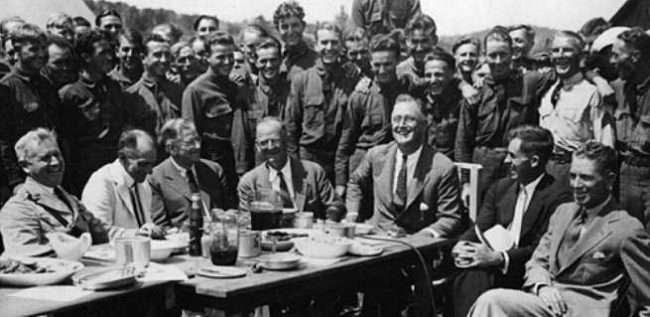
Some American myths go all the way back to the nation’s founding. Like the one where, as a young boy, America’s first president, George Washington, felt compelled to tell the truth about taking a hatchet to his father’s cherry tree because he could not tell a lie.
“There are plenty of lies that are kind of white lies that have a positive spin,” says Kevin M. Kruse, a professor of history at Princeton University. “And what’s the harm there? It teaches children the value of honesty.”
The real harm comes, Kruse says, when lies or myths impact U.S. government policy. Kruse and fellow Princeton historian Julian E. Zelizer put together a collection of essays for their book, “Myth America: Historians Take on the Biggest Legends and Lies About Our Past.”
In the anthology, 20 mainly liberal historians take on what they see as conservative distortions of the history behind hot-button issues like border security, voter fraud, police brutality and the backlash against civil rights protests in the aftermath of the 2020 police killing of George Floyd, a Black man.
Glenda Gilmore of Yale University writes that a sanitized, somewhat one-dimensional image of civil rights activist Martin Luther King, leader of “good protests,” obscures his relevance to the Black Lives Matter protesters who took to the streets in the aftermath of Floyd’s death.
“[Martin Luther King, Jr.] was much more searing in his denunciations of capitalism [and] militarism,” Kruse says. “King has been shorn of all that controversy and complications, reduced to this non-offensive figure who simply stood up and said, ‘Well, racism is bad and everyone agrees.’
“As a result, that seals him off from any connection to the present. That example of the good civil rights protest is constantly held up in contrast to bad civil rights protests to shame people involved in Black Lives Matter for not being like King when, in fact, they’re actually a lot like King.”
Northwestern University historian Geraldo Cadava writes that Americans who are worried about policing the southern border with Mexico have “displaced anxieties about imperial and national decline, economic fragility, and demographic change.”
Natalia Mehlman Petrzela, a professor of history at The New School, challenges the notion that feminism embraces anti-family values by exploring how feminists have historically defended the traditional family.
Eric Rauchway, a history professor at the University of California, Davis, has studied the New Deal, a series of programs, financial reforms and regulations signed into law by President Franklin D. Roosevelt in the 1930s to help America recover from the Great Depression. In the book, Rauchway challenges the assertion of some conservative politicians that the New Deal was ineffective.








